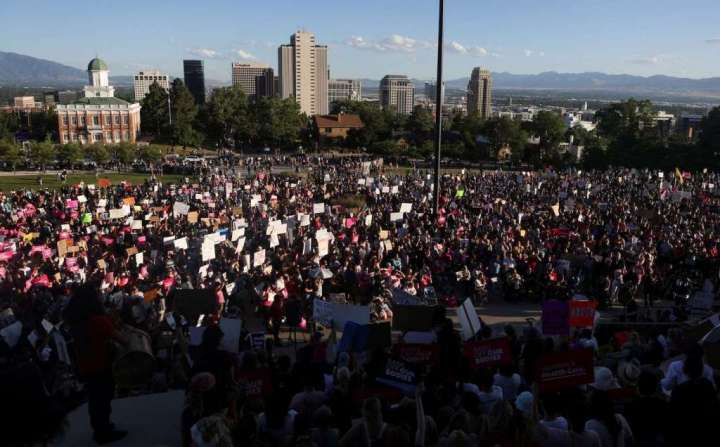A judge in Utah granted a temporary restraining order to block the state’s “trigger ban” on Monday, allowing abortion services to resume immediately.
Utah judge allows abortions to resume after Planned Parenthood sued

Utah’s trigger ban, which the legislature passed in 2020, prohibits abortions with limited exceptions, such as if the procedure is necessary to prevent a pregnant person’s death or if a person is pregnant as a result of incest or rape.
PPAU sought the temporary restraining order to prevent Utah officials from “enforcing this flagrantly unconstitutional law,” according to the complaint.
“The Supreme Court ruling was devastating and terrifying for our patients and providers, but at least for now, Utahns will be able to get the care they need,” Karrie Galloway, president and chief executive of PPAU, said in a statement after the ruling. “Today is a win, but it is only the first step in what will undoubtedly be a long and difficult fight.”
In his ruling, Stone wrote that the temporary restraining order was in the public interest and that the state’s trigger ban “upsets the longstanding status quo on which Utah women and their families have relied for at least five decades.”
“Without a temporary restraining order, the Act will cause irreparable harm to PPAU, its patients, and its staff,” Stone wrote. “If left in place, the Act will force many Utahns to continue carrying a pregnancy that they have decided to end, with all of the physical, emotional, and financial costs that entails.”
Richard Piatt, communications director for Utah Attorney General Sean Reyes (R), said the office had no comment Monday afternoon. Other state officials named as defendants in the lawsuit — Gov. Spencer Cox (R) and Division of Occupational and Professional Licensing Director Mark Steinagel — did not immediately respond to The Washington Post’s request for comment.
Sen. Dan McCay (R), who co-sponsored Utah’s trigger ban, said in a statement Monday that Stone’s ruling to grant a temporary restraining order was “disappointing.”
“Statistically 8.2 babies are aborted every day in Utah,” McCay’s statement said. “Sadly, Judge Stone sentenced 115 babies to death.”
Utah is one of 13 states with trigger bans that were designed to prohibit abortion if Roe were to fall. The state’s ban took effect Friday evening, after its legislative general counsel certified the Supreme Court decision.
Although the lawsuit to block the ban was filed the following day, Galloway said the organization had been planning for legal action long before the Supreme Court ruling.
“We’ve been on notice for a while,” Galloway told The Washington Post. “We’ve been on notice since the last administration wiggled their way into three court nominations. We knew what was the writing on the walls.”
When the trigger law went into effect, PPAU said in its court filing that it had canceled abortions for about a dozen patients Saturday. The organization has three health clinics that were licensed to provide abortion services, according to Galloway.
“We couldn’t help them today,” she said. “And the people next week are going to be dealing with the same thing if we don’t get a temporary restraining order and put this law on hold.”
A person convicted of violating the trigger law may face one to 15 years in prison, a fine of up to $10,000 or both.
According to the lawsuit, the state’s ban harms people experiencing hardship — including poverty, addiction and abusive relationships.
“If left in place, the Criminal Abortion Ban will be catastrophic for Utahns,” the lawsuit said. “The Act will force some Utahns seeking abortion to instead carry pregnancies to term against their will, with all of the physical, emotional, and financial costs that entails.”
In a statement to the Salt Lake Tribune on Friday, Reyes said the Supreme Court ruling was “clear,” adding that he would be ready to defend the trigger law against legal action.
“It has returned the question of abortion to the states. And the Utah legislature has answered that question,” Reyes said in the statement. “My office will do its duty to defend the state law against any and all potential legal challenges.”
Cox and Utah Lt. Gov. Deidre Henderson (R) said in a statement Friday that they “wholeheartedly support” the Supreme Court’s ruling.
“As pro-life advocates, this administration is equally committed to supporting women and families in Utah,” the joint statement said. “We all need to do more to support mothers, pregnant women, and children facing poverty and trauma.”






